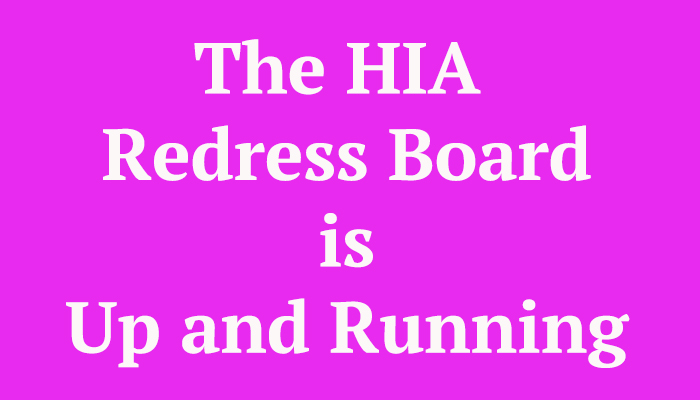Opening of Historical Institutional Abuse (HIA) Redress Board
The First Minister and deputy First Minister have announced that the Historical Institutional Abuse Redress Board is open for applications.
Welcoming the news, First Minister Arlene Foster said: “Following the passage of the legislation in November 2019, officials across a number of departments have been working at pace to ensure that the Redress Board and compensation scheme opens as quickly as possible. As a result, I am pleased to confirm that the HIA Redress Board has today opened for applications.”

The First Minister added: “With the coronavirus outbreak, this is a challenging time for government and indeed for society as a whole. However, we owe it to victims and survivors to ensure work continues in this key area as far as is possible in the current circumstances. Decisions will inevitably take longer than originally planned but victims and survivors can be assured we are committed to doing all we can to progress payments. Redress panel members and staff are working from home, so you can help us by applying through a solicitor, which keeps the applications digital.”
Deputy First Minister Michelle O’Neill said: “Historical institutional abuse should never have happened. This was wrong. It robbed thousands of children of their childhood who were failed by a system that should have protected them. It is a sad reality that so many of these children were forced to spend their lives carrying extraordinary trauma, pain and suffering. While no scheme will make up for what was endured, we owe it to all victims and survivors to ensure that they get the redress they deserve.
“As we launch the Historical Institutional Abuse Redress Board today our thoughts are with all victims and survivors, and their families. My thoughts today are also with those who are no longer with us. Redress has been a long time coming and I pay tribute to all victims and survivors who, through their collective will, determination and resilience, have brought us to this important day of acknowledgement.
“I would encourage as many of those affected as possible to come forward and make an application to the Redress Board, through a solicitor if possible.”
The best way to make an application to the redress board is to contact a solicitor. Free legal advice is available to all applicants to the HIA Redress Board to assist with the application. But please don’t visit a solicitor’s office. Follow the health advice to stay at home and telephone or email.
Anyone who was resident in an institution here between 1922 and 1995 and suffered or witnessed abuse or were subject to a harsh environment can apply to the Redress Board. You may also be eligible to apply if you were sent to Australia under the Child Migrant Programme.
You can also apply on behalf of someone who has died if you are their spouse, civil partner, cohabiting partner or child. Financial redress cannot take away the harm people have experienced but it is an acknowledgement from the Executive of what victims and survivors have suffered.
There is a five-year window in which to make applications, so applicants who prefer to wait until they can deal face-to-face with a solicitor will still have plenty of time to lodge an application. Alternatively an application form can be printed off from the Redress Board website at:
or is available by e-mailing the HIA Redress Board at:
In the current public health situation, The Executive Office and the Board have put additional technology and other contingency arrangements in place, but have welcomed the recognition on the part of victims’ and survivors’ groups that systems are not operating as originally envisaged and this will have an impact on timescales.
McGrath welcomes opening of HIA Redress Board.
SDLP Chair of the Executive Office Committee Colin McGrath MLA has welcomed the opening of the Historical Institutional Abuse Redress Board.

The South Down MLA said: “Following the legislation passed in Westminster late last year, officials have worked quickly to ensure that the Redress Board and compensation scheme opens as quickly as possible, which has happened today.
“I want to acknowledge hard work of staff to ensure the original deadline of the Board opening was achieved, in the context of added pressures with the outbreak of COVID-19. As Committee Chair, I pressed officials to ensure the deadline was met. Victims and survivors have had to wait far too long.”
“No amount of money or any scheme will ever make up for what the victims and survivors endured as a result of historical institutional abuse. It should never have happened and it caused unimaginable pain and trauma to thousands of children, many of whom still carry that pain with them today. Compensation will not make up for their pain, but it is the very least they deserve.”
“I want to pay tribute to the victims and survivors, many of who are sadly no longer with us. Their campaign has been tireless. I am pleased that we are finally able to provide some redress for them. I would encourage all to apply, through a solicitor if at all possible.
“Victims and survivors have been engaged throughout the work on policy and legislation for the scheme and also, through the Interim Advocate Brendan McAllister, in the design of applications processes and practical considerations relating to the scheme. The Interim Advocate’s website includes a list of frequently asked questions at:
www.hiainterimadvocate.org.uk/faqs.html
NSPCC NI statement after Justice Minister Naomi Long MLA (March 31) introduced the Domestic Abuse and Family Proceedings Bill 2020 to the Assembly.
Orla O’Hagan, Acting Policy & Public Affairs Manager at NSPCC Northern Ireland said: “For too long children have been the forgotten victims of domestic abuse in Northern Ireland and this Bill is a significant step towards putting that right.
“Plans to increase sentences whenever a child sees, hears or is present during an incident are particularly welcome.
“We look forward to working with the Assembly over the coming months to ensure that protection and support for child victims experiencing domestic abuse are recognised in the Bill.”
Anyone concerned about a child can contact the NSPCC helpline on 0808 800 5000 or :

























